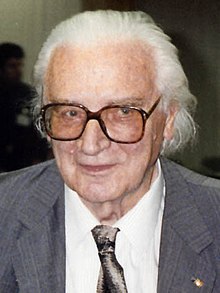
Back كونراد سوزه Arabic كونراد سوزه ARZ Konrad Zuse AST Konrad Tsuze Azerbaijani کنراد تسوزه AZB Конрад Цузе Bulgarian কনরাড ৎসুজে Bengali/Bangla Konrad Zuse BS Konrad Zuse Catalan Konrad Zuse Czech
Konrad Zuse | |
|---|---|
 Konrad Zuse in 1992 | |
| Born | Konrad Ernst Otto Zuse 22 June 1910 |
| Died | 18 December 1995 (aged 85) Hünfeld, Hesse, Germany |
| Alma mater | Technical University of Berlin |
| Known for |
|
| Awards |
|
| Scientific career | |
| Fields | |
| Institutions | Aerodynamic Research Institute |
| Signature | |
Konrad Ernst Otto Zuse (German: [ˈkɔnʁaːt ˈtsuːzə]; 22 June 1910 – 18 December 1995) was a German civil engineer, pioneering computer scientist, inventor and businessman. His greatest achievement was the world's first programmable computer; the functional program-controlled Turing-complete Z3 became operational in May 1941. Thanks to this machine and its predecessors, Zuse is regarded by some as the inventor and father of the modern computer.[5][6][7][8][9][10]
Zuse was noted for the S2 computing machine, considered the first process control computer. In 1941, he founded one of the earliest computer businesses, producing the Z4, which became the world's first commercial computer.[11] From 1943[12] to 1945[13] he designed Plankalkül, the first high-level programming language.[14] In 1969, Zuse suggested the concept of a computation-based universe in his book Rechnender Raum (Calculating Space).[15][16][17]
Much of his early work was financed by his family and commerce, but after 1939 he was given resources by the government of Nazi Germany.[18] Due to World War II, Zuse's work went largely unnoticed in the United Kingdom and United States. Possibly his first documented influence on a US company was IBM's option on his patents in 1946.[19]
- ^ editor, ÖGV. (2015). Wilhelm Exner Medal. Austrian Trade Association. ÖGV. Austria.
- ^ a b Cite error: The named reference
Eibisch_2016was invoked but never defined (see the help page). - ^ Cite error: The named reference
Eibisch_2009was invoked but never defined (see the help page). - ^ Cite error: The named reference
Bock-Eibisch_2010was invoked but never defined (see the help page). - ^ Rojas, Raúl (1997). "Konrad Zuse's Legacy: The Architecture of the Z1 and Z3" (PDF). IEEE Annals of the History of Computing. 19 (2): 5–16. doi:10.1109/85.586067. Archived (PDF) from the original on 26 April 2021. Retrieved 12 May 2021.
Konrad Zuse is popularly recognized in Germany as the father of the computer, and his Z1, a programmable automaton built from 1936 to 1938, has been called the first computer in the world. Other nations reserve this honor for one of their own scientists, and there has been a long and often acrimonious debate on the issue of who is the true inventor of the computer.
- ^ Flippo, Hyde. "Konrad Zuse: The first programmable, digital computer". german-way.com. The German Way & More. Archived from the original on 31 May 2013.
The German civil engineer Konrad Zuse is considered the inventor of the first digital and programmable computers
- ^ von Leszczynski, Ulrike (27 June 2010). "Z like Zuse: German inventor of the computer". monstersandcritics.com. Deutsche Presse-Agentur. Archived from the original on 22 May 2013. Retrieved 22 May 2013.
There's strong evidence that [Zuse] built the world's first computer in Berlin.
- ^ Bellis, Mary (15 May 2019) [First published 2006 at inventors.about.com/library/weekly/aa050298.htm]. "Biography of Konrad Zuse, Inventor and Programmer of Early Computers". thoughtco.com. Dotdash Meredith. Archived from the original on 13 December 2020. Retrieved 3 February 2021.
Konrad Zuse earned the semiofficial title of 'inventor of the modern computer'
- ^ "Who is the Father of the Computer?".
- ^ Bruderer, Herbert (2021). Milestones in Analog and Digital Computing (3rd ed.). Springer. pp. 13, 961. ISBN 978-3030409739.
- ^ Bruderer, Herbert (2021). Milestones in Analog and Digital Computing (3rd ed.). Springer. p. 14. ISBN 978-3030409739.
- ^ Zuse, Konrad (1943), "Ansätze einer Theorie des allgemeinen Rechnens unter besonderer Berücksichtigung des Aussagenkalküls und dessen Anwendung auf Relaisschaltungen" [Inception of a universal theory of computation with special consideration of the propositional calculus and its application to relay circuits], unpublished manuscript, Zuse Papers 045/018.
- ^ A book on the subject: (full text of the 1945 manuscript) Archived 10 February 2012 at the Wayback Machine
- ^ Cite error: The named reference
HZ2010-11-18was invoked but never defined (see the help page). - ^ Cite error: The named reference
Zuse_1967_RRwas invoked but never defined (see the help page). - ^ Cite error: The named reference
Zuse_1969_RRwas invoked but never defined (see the help page). - ^ Cite error: The named reference
MIT_1970_RRwas invoked but never defined (see the help page). - ^ "Weapons Grade: How Modern Warfare Gave Birth To Our High-Tech World", David Hambling. Carroll & Graf Publishers, 2006. ISBN 0-7867-1769-6, ISBN 978-0-7867-1769-9. Retrieved 14 March 2010.
- ^ Schmidhuber, Jürgen (19 August 2021). "1941: Konrad Zuse completes the first working general-purpose computer, based on his 1936 patent application". Universita della Svizzera Italiana.